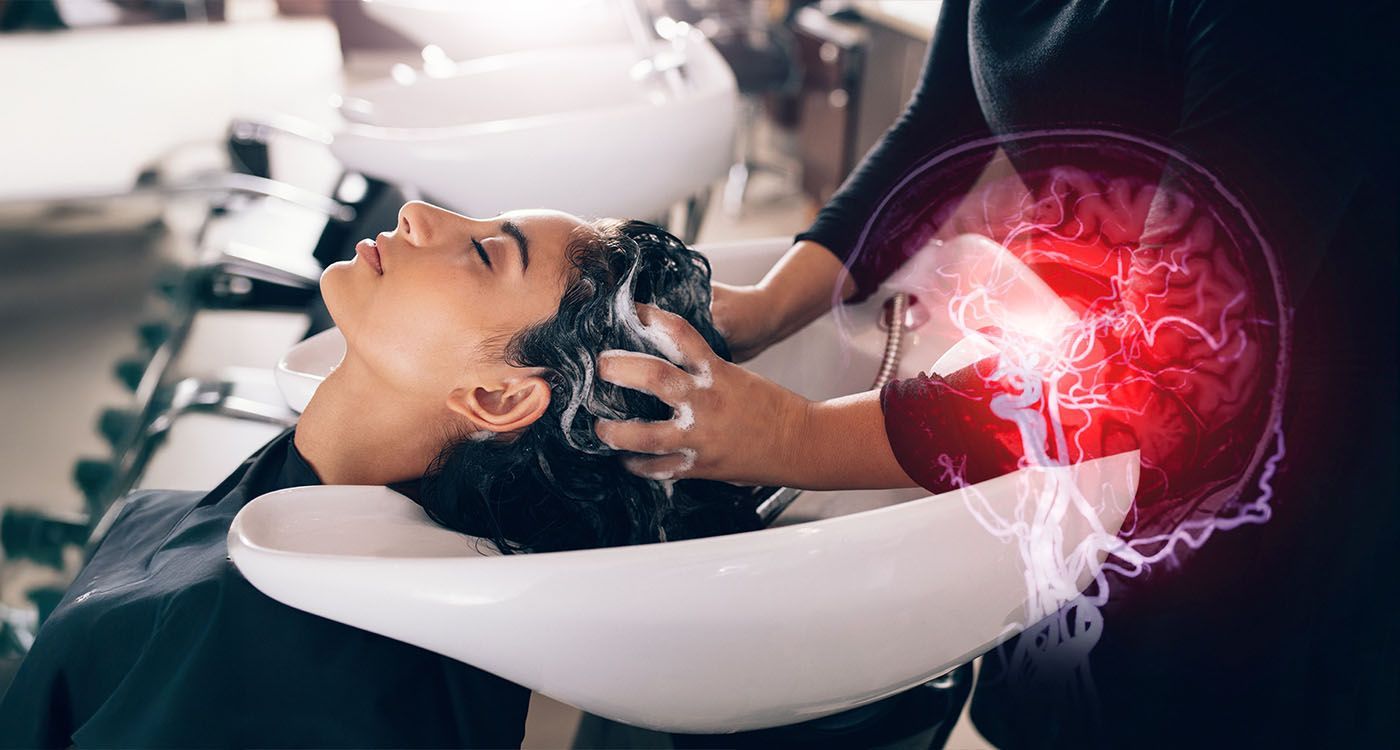
After suffering a stroke following a simple visit to the hair salon, 39-year-old Julien is shedding light on a little-known condition: Beauty Parlor Stroke Syndrome. Behind its harmless name lies a rare but very real medical phenomenon that deserves more awareness to help prevent similar accidents.
That day, Julien never imagined that a simple shampoo would turn his life upside down. Sitting comfortably at the basin with his head tilted back, he enjoyed a moment of calm, unaware that a hidden danger was looming. A few days later, he suffered a stroke. On Instagram, he shared:
“When I had my stroke, one of the first questions the neurologists asked was, ‘Have you been to the hairdresser recently?’ At first, I thought it was a joke.”
It was no joke. Doctors were aware of a little-known phenomenon called shampoo basin syndrome, also known in medical literature as beauty parlor stroke syndrome. First reported in 1993 in The Lancet, it occurs when the head is tilted too far back or held in an awkward position for too long during a hair wash. A simple, everyday gesture performed millions of times worldwide can, in very rare cases, trigger a stroke.
An Unexpected Mechanism
How can a simple tilt of the head trigger a stroke? It all comes down to the blood vessels in the neck. When the head is tilted far back, the vertebral arteries, which supply the brain with blood, can become compressed or stretched as they pass through the cervical vertebrae.
In some cases, this strain can cause an arterial dissection, a small tear in the inner wall of the artery. Blood can then seep into this tear, forming a clot that may block blood flow to the brain. This can lead to a stroke, sometimes hours or even days after the hair wash.
This can happen in the vertebral arteries at the back of the neck or, more rarely, in the carotid arteries at the front. It does not only affect older or sick individuals. Cases have been reported in young and healthy people like Julien.
Most patients, however, have some preexisting arterial vulnerability, such as high blood pressure, atherosclerosis, congenital anomalies, or vessel inflammation.
Rare but Real Cases
Since the first report in The Lancet, only a few cases have been documented worldwide. In 2016, 45-year-old Adele Burns from Scotland suffered a stroke after six consecutive hair washes and had to relearn how to walk and speak. In the United States, 48-year-old Elizabeth Smith experienced a similar incident caused by a wash basin that was too high and a poorly adjusted chair.
Symptoms can appear immediately or develop in the days that follow and include unusual headaches, dizziness, vision problems, numbness on one side of the body, difficulty speaking, or loss of balance. These warning signs should never be ignored. If you suspect something is wrong, seek urgent medical attention, as early intervention greatly improves recovery chances.
Even so, these cases are extremely rare. Millions of hair washes happen every year without incident. Beauty parlor stroke syndrome is a medical curiosity rather than a widespread danger, but it highlights that certain positions can pose hidden risks for people with underlying vulnerabilities.
Caution and Prevention
Should you now fear the hair-washing basin? Absolutely not. The pleasure of being pampered at the salon should not give way to fear. Yet, as in much of medicine, prevention relies on vigilance and common sense.
Experts recommend the following:
- Avoid overextending your neck. If your head is tilted too far back, ask your stylist to adjust the chair slightly or place a cushion under your neck.
- Prioritize comfort. If the position feels awkward, speak up. It is not fussiness; it is a precaution.
- Tilt your head forward for washing if you have neck pain or a history of vascular issues. This position reduces pressure on the neck.
- Inform your stylist about any previous arterial or neck problems. Many professionals are unaware of this syndrome, and your mention can raise their awareness.
- Stay alert after your visit. If neurological symptoms appear in the hours or days following your appointment, do not wait. Every minute counts.
Training and Awareness
Neurologists emphasize the importance of raising awareness among hairdressers. Many are unaware that poor posture, in rare cases, can have serious consequences. Simple training could make a big difference: adjusting basin height, providing proper neck support, and avoiding prolonged positions.
Some UK salons have already equipped their basins with ergonomic cushions to reduce neck strain. In France, the topic is just emerging. And in Lebanon, with arguably one of the highest rates of blow-drying in the world, can special attention to this subtle risk be expected?
The shampoo basin syndrome reminds us that even a simple gesture can sometimes have unexpected effects. Without causing alarm, it simply encourages better body awareness because knowledge often protects better than fear.

Comments